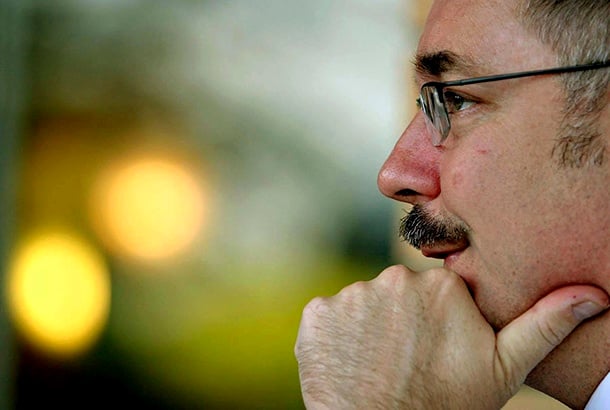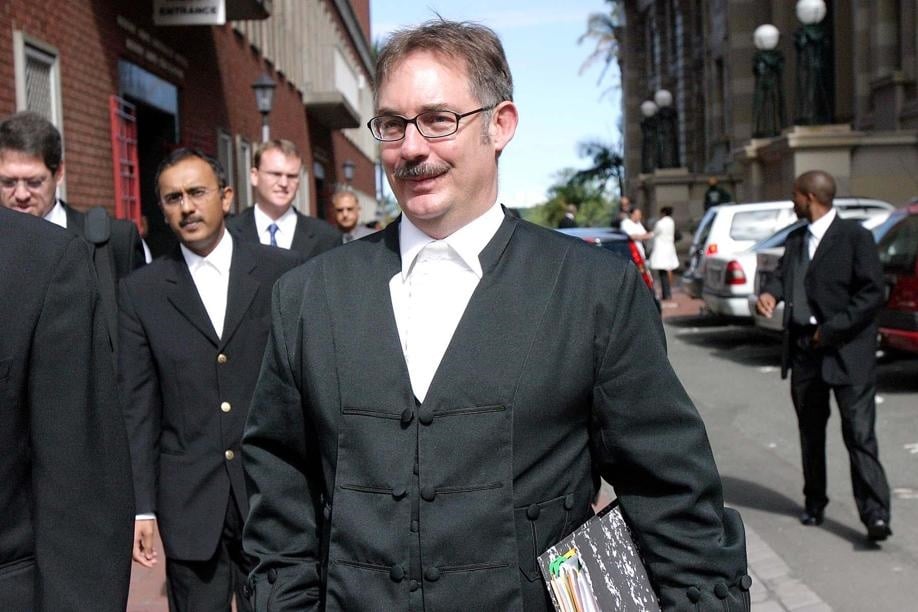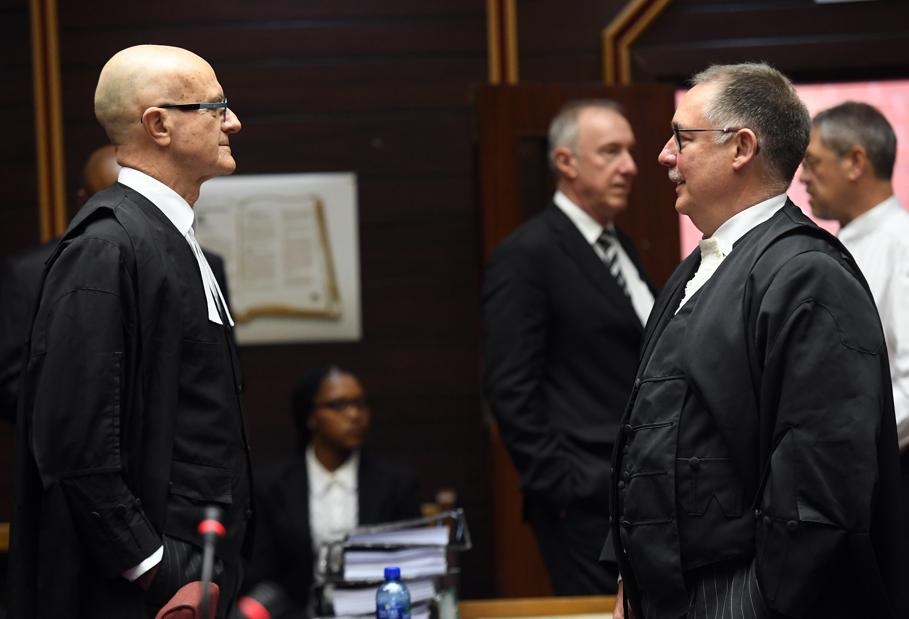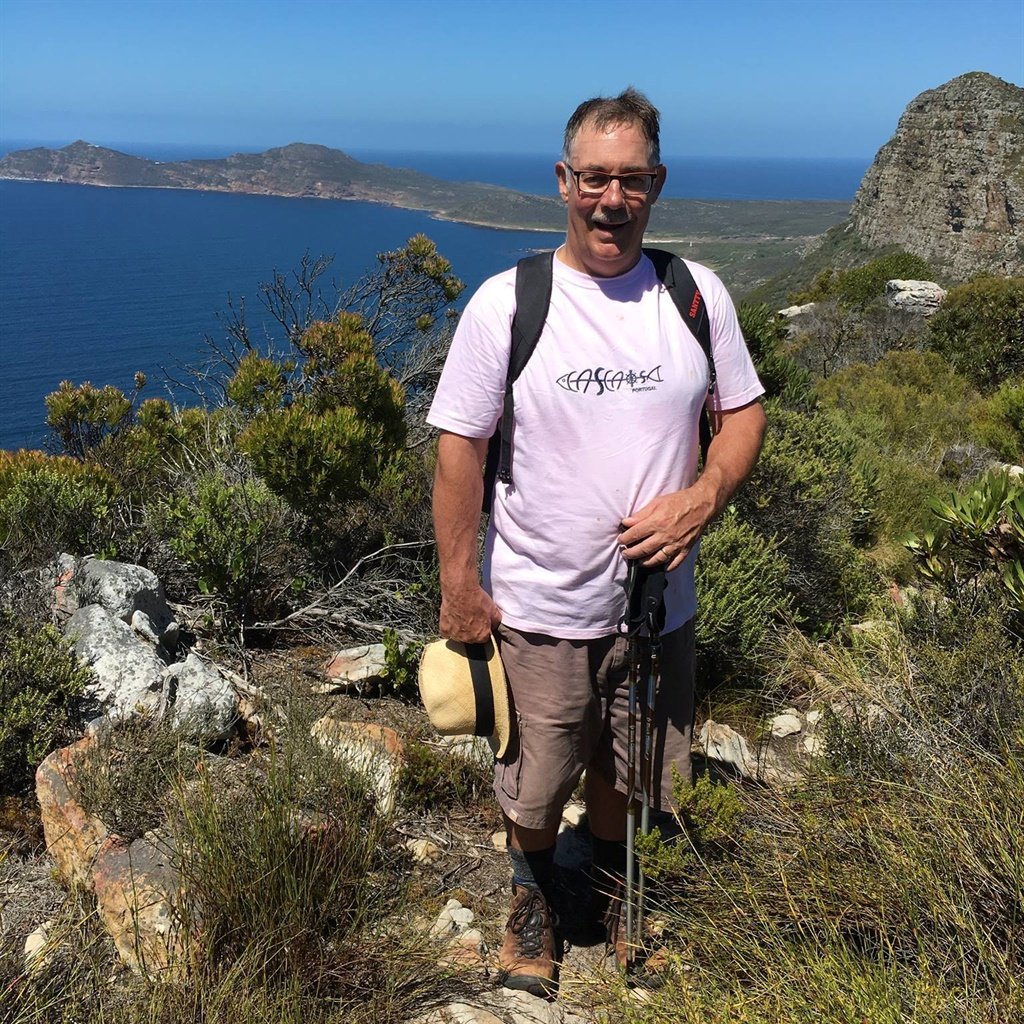
Senior State advocate Billy Downer would rather be sitting on the stoep of his holiday home in Simon's Town, drinking a gorgeous red wine with his husband after a long gratifying day walking the Cape Peninsula, than prosecuting Jacob Zuma.
But nearly 20 years after the so-called arms deal docket came into the mustachioed prosecutor's purview, the corruption case against the former president is still consuming his time and energy.
This week Downer appeared in the KwaZulu-Natal High Court in Pietermaritzburg - as close, perhaps, as he has ever been to actually leading evidence against Zuma. A full Bench of the court had just days before turned down a defence application for a stay of prosecution, paving the way for the trial.
Downer, 62, has been standing by, ready to lead evidence in this matter for 14 years as Zuma and his lawyers have employed their Stalingrad strategy. This has been the case from the 2006 decision of Judge Herbert Msimang to strike the case from the roll to the enormously controversial Nicholson judgment in 2008, and the subsequent decision of acting national director of public prosecutions (NDPP) Mokotedi Mpshe to withdraw charges, through the DA's fight to access the "spy tapes", to the present reincarnation of the case which has largely defined South Africa's post-democratic political landscape.
As Downer nears retirement age, this could be his last hoorah, a swansong before he goes off for long walks and sits on his "stoep".
On the side of the angels
Born into a middle-class upbringing in Pretoria in 1956, Downer's parents were old-style liberal "Sappe", rabidly anti-nationalist supporters of the United Party. Life was happy and wonderful, living a decent existence largely cloistered from the political reality of apartheid.
His mother was a physiotherapist and his father a manager at law firm Adams & Adams. A colonel in the SA Air Force, his father was a fighter-bomber pilot who had been imprisoned at Stalag Luft I, a German prisoner-of-war camp on the Baltic Sea.
The most formative influence on Downer's sense of justice came during his years at Pretoria Boys' High School (PBHS). While he learnt morality from his thoroughly decent parents who were appalled by any transgression of the law, PBHS instilled in him an ethos that would stay with him on his journey through life. The emphasis was on doing the right thing.
At school he excelled in sports and drama – he was the swimming captain and played water polo, while also starring in the comic operettas of Gilbert and Sullivan. Latin was his favourite subject.
For the adolescent Downer who had never confronted corporal punishment at his progressive public high school, the deep conservatism of Stellenbosch University and the Dagbreek residence came as a great shock. He went to the town to study law like his father had and found himself marching military style around campus and being smacked around.
He graduated with a law degree in 1979 and was awarded a prestigious Rhodes scholarship to study at Brasenose College at the University of Oxford. Downer returned to South Africa in his mid-20s with an Oxford education and a plan to join the Bar as an advocate. But he was broke and had six months to kill before the next army call up, so he got a job at the justice department in Kuilsriver, doing "dronk op straat" (public drunkenness) cases and common assaults.
He did a two-year stint in the army, advising the Director of Military Law on reviewing court martials of high-ranking officers. He capitalised on a deal on offer at the justice department at the time – they continued to pay his salary while he did his service and, in turn, he had to commit to working a further two years, which he did, at the Wynberg Magistrate's Court. He always intended leaving the prosecuting authority but since he was about to resign, Downer was handpicked to join the attorney general's office, then headed by Neil Rossouw, and his career as a prosecutor took off.
ALSO READ | ConCourt to hear Zuma 'state capture' legal costs appeal bid
Downer was attracted to the pure law aspects of prosecuting, practising criminal law, the law of evidence and criminal procedure. He liked the fact that he was, usually, on the side of the angels. He specialised in commercial matters and found in former attorney-general Frank Kahn a mentor who he instinctively clicked with. Downer had his pick of the most appetising cases and his career prospered.
The little opinion that lasted two decades
In late 2000, a "super investigating" team was set up under then National Director of Public Prosecutions (NDPP) Bulelani Ngcuka to probe the multibillion-rand arms deal. Downer was recruited by advocate Gerda Ferreira in Pretoria to assist.
He was only meant to draw up a legal opinion on one leg of the investigation, featuring the Shaik brothers, Chippy and Schabir. Little did he know that it would be the case that would consume him for the bulk of his career.
Downer successfully led the prosecution of Zuma's former financial advisor Schabir Shaik who was convicted in 2004 and sentenced to 15 years in prison by Judge Hilary Squires.
The prosecutor fundamentally disagreed with Ngcuka's decision to not try Shaik and Zuma together – for Downer it was a no-brainer. The practicalities of running two separate trials were immense and the consequences of that decision are still playing out today.
As a career civil servant, Downer watched from the sidelines as three successive NDPPs – Ngcuka, Vusi Pikoli and Mokotedi Mpshe – ignored his advice and made catastrophic decisions about the Zuma case.
In 2009 specifically, Downer argued vehemently that the prosecution should continue and a court of law should decide whether the "spy tapes" fatally infected the case. Downer sat stony faced at the National Prosecuting Authority (NPA) office in Silverton as Mpshe announced his conclusion to the country.
Close confidants of "the kid", as Downer was called in those contentious recordings, speak of how "devastated" and "gutted" he was by those decisions and the two striking-off judgments in the KwaZulu-Natal High Court in Pietermaritzburg.
"He had spent nearly five years doing an enormous amount of work, personally drafting and answering affidavits on weekends and holidays and travelling continuously. It was a personal sacrifice that he shouldn't have had to make," one NPA colleague said.
"The Nicholson judgment was the worst on him. He felt that it really rankled. It weakened the resolve of the NPA and allowed politics to play a role."
Despite this, Downer maintained his decorum, only speaking out about his internal strife once, in a speech to the Middle Temple conference in October 2010. He criticised the three NDPPs for failing to take his advice.
Ironically, both the Msimang and Nicholson judgments were remedied by higher courts which brought some solace to the prosecuting team. Then in 2016, Judge Aubrey Ledwaba handed down a hard-hitting ruling effectively vindicating Downer. Ledwaba quoted extensively from Downer's memorandums to Mpshe in which he desperately urged him to not drop the charges. The judge admonished Mpshe for ignoring the advice.
Ledwaba opened the door for Zuma to be recharged and Downer was back in business. He had spent the interim seven years busying himself with running an anti-corruption unit and trying other matters, most notably one that led to the conviction of former Western Cape police commissioner Arno Lamoer and other high-ranking police officers accused of corruption.
He also served as a member of the executive of the International Association of Prosecutors (IAP), is a senator at the IAP and is one of the oldest members of the global Corruption Hunters Network.
But in 2018, nearly a decade after Mpshe's decision, then NDPP Shaun Abrahams announced Zuma would be recharged and it was an inevitability that Downer would lead the prosecution.
Decide first what is right, then find the law to fit it
When Downer was admitted as an advocate in the High Court in Pretoria in 1980, his father's friend, Frank Kirk-Cohen, was roped in to appear for him. Kirk-Cohen, who became a well-known judge, sat down the young lawyer and shared with him a seminal lesson that would stay with him throughout his career.
The legendary judicial officer said.
Downer is very much about doing the right thing. "It is black and white with Billy but he can be reasoned with. He's methodical and very concerned about the process and administration," a Cape Town prosecutor said.
"He's incredibly forensic and very detailed. He doesn't go into a case unless he really, really knows he's going to win and he's very prepared," journalist Stephen Grootes, who reported on the Shaik trial, said.
There have been criticisms of Downer's aggressive approach. One colleague accused him of putting too much spice into his arguments and skating close to the edge of honesty. But throughout, he has maintained a gentlemanly integrity.
"He gets very aggressive. He can bully by playing a game when the wind is in his sail.
I think there's something valuable about a prosecutor doing that. A good defence counsel will run rings around a weak prosecutor and that doesn't happen with Billy. Billy has the same reputation as the defence counsel – he'll do the best for his client, in this case the public. He would have been an outstanding criminal defence advocate," said a silk who worked with him.
"You would presume Downer is being ponderous and a bit pompous but he's not actually like that. He doesn't have airs and graces or gutter smarts. He's very urbane," a senior journalist who reported on the Zuma case commented.
Downer does have a sense of theatre and drama when leading evidence. At the start of the Shaik trial, his introduction to Squires was the opening lines of Book 1 of Virgil's Aeneid in Latin. Arma virumque cano – "I sing of arms and the man" (Squires, a Classicist took issue with his translation of the Latin and told him as much).
"When he cross-examines a witness he doesn't look at the witness. He looks at the wall or into space…. doesn't make eye contact, he just goes. When he cross-examined Shaik, it was devastating," recalled Grootes. "He's also incredibly funny and has a cynical realism."
Doggedly duty bound or blindly obsessed?
In court papers filed as part of Zuma's application for a stay of prosecution this year, the former president accused his prosecutor of being blinded by an obsession to see him behind bars and claimed he was driven by hatred and apartheid withdrawal symptoms.
Downer was incensed. He responded by suing Zuma and asking the High Court to strike out more than a dozen "scandalous and vexatious" untrue statements.
Downer stated in his papers:
Zuma agreed to strike out the accusations but a bitter taste remained. Those close to Downer insist he is not obsessed or unusually patient. Instead, he has become caught up in a very frustrating process which has dogged his career. He would have preferred to have wrapped up the case and retired. He has an overinflated sense of duty to finish the matter. In truth, he is so steeped in the facts that he has to prosecute this case which is seen as a mirror of the Shaik trial.
Downer and his partner of 35 years William, whom he married in 2009 in the wake of the Mpshe decision, will be hoping that retirement is not far off. The couple are avid walkers having walked the Camino de Santiago in Spain and the Magna Via Francigena in Sicily, and recently travelled to Ethiopia. Downer is also a keen gardener and cook.
And then there's the "stoep" in Simon's Town.
But before he can savour the prospects of life after Zuma, he has to finish a two-decade long commitment to what he believes is the right thing, and finding the law to fit the case.





